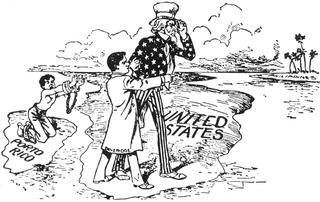
 |
With this senatorial experience and his democratic disposition it was easy and natural for him to go with Roosevelt into the Progressive party in 1912. In the Progressive National Convention in Chicago in that year it was Beveridge, as temporary chairman, who sounded the "keynote" in a campaign address, entitled "Pass Prosperity Around." During the same year he was nominated by the Progressive party of Indiana as its candidate for governor. He received 10,000 more votes than the Republican candidate, but was defeated by the Democratic candidate, Samuel M. Ralston. In 1914, after the adoption of the Seventeenth Amendment, the Indiana Progressives nominated Beveridge as their candidate for the United States Senate, but Progressive support had fallen away, and he came in third in the popular vote. In 1916, together with Roosevelt, he rejoined the Republican party, and supported Charles E. Hughes for the presidency. In 1922 he was nominated for the United States Senate by the Republicans of Indiana in a state-wide popular primary, defeating Harry S. New, the sitting senator, but in the ensuing election he was again defeated by Samuel M. Ralston, the Democratic nominee. This closed his political career.
He was a pronounced nationalist, suspicious of foreign countries, with some anti-British feeling, a stout opponent of America's having anything to do with the League of Nations; at times disposed toward jingoism in speech, declaring himself for "America first! Not only America first, but America only!" He was somewhat temperamental, but his finer qualities greatly overtopped his minor defects. He had a rare political aptitude, and no man ever questioned his public integrity or his political courage.
But he was even more distinguished as a historical writer than as a politician. In his early service in the Senate he already showed an overwhelming desire to get information at first hand, even traveling to the Philippines in order to make a personal investigation of the Philippine problem. During the Japanese and Russian struggle in order to satisfy himself as to the situation he took a trip to Siberia and Russia, the outcome of which was The Russian Advance, published in 1903. In 1905 he brought out The Young Man and the World, in 1906 The Bible as Good Reading, in 1907 Meaning of the Times, in 1908 Work and Habits and Americans of Today and Tomorrow,--volumes intended especially for young men and women. In 1915, while spending a year as a war correspondent in Germany he produced his What Is Back of the War, which was regarded in America as distinctly pro-German, and brought the author some unpopularity. Beveridge's greatest work, however, was his biography of Chief Justice John Marshall, designed as an historical and political interpretation of the Supreme Court and of Marshall's part in giving that court its place in American history. This task he accomplished in a way that gained the universal approval of scholars and critics. As a biographer Beveridge showed his characteristic industry in gathering his materials, a discriminating mind in sifting and evaluating, a painstaking care in revising and rewriting until the facts took on their right relations and proportionate importance, and "the picture stood out as an historic and artistic whole." Bringing to his task sympathy for his subject, the art of eloquent and effective writing, and an undimmed historical imagination, he produced an outstanding historical biography. The first two volumes of The Life of John Marshall appeared in 1916, the second two in 1919. Beveridge then turned his attention to what he considered a harder and more important task, a similar biography of Lincoln in four volumes. At the time of his death two of these volumes had been substantially completed. He brought to this task the same qualities that had been applied to his Marshall. He had a horror of mistakes and his completed chapters had been read in manuscript by many historical scholars and were carefully revised and rewritten, some of them as many as fifteen times. His death was regretted on many accounts, but above all because of the loss to the world of his uncompleted Lincoln. He died Apr. 27, 1927.
text by James A. Woodburn, Dictionary of American Biography